- Home
- Dornford Yates
The Brother of Daphne Page 15
The Brother of Daphne Read online
Page 15
CHAPTER XIV
A PRIVATE VIEW
When I had adjusted the cushions, I sank into the chair and sighed.
"What's that for?" said Daphne
"Sin," said I.
"Whose?"
"That of him who packed for me at the Blahs this morning. A sin ofomission rather than commission, though he did put my sponge-bag intomy collarcase," I added musingly. "They're both round, you see.Still, I pass that by."
"But what do you really complain of?" said Jill. "He's left mydressing-gown out."
"I expect he thought it was a loose cover," said Jonah. "It'll be senton all right," said Daphne "That's nothing. What about my fan?You're not a bit sorry for me about that."
"I have already been sorry about it. I was sorry for you on Fridayjust by the sideboard. I remember it perfectly. All the same, if youwill waste Berry's substance at places of entertainment in the WestEnd, and then fling a priceless heirloom down in the hall of thetheatre, you mustn't be surprised if some flat-footed seeker afterpleasure treads on it."
"He was a very nice man, and his feet weren't a bit flat."
"I believe you did it on purpose to get into conversation with him.Where's Berry?"
At that moment the gentleman in question walked across the lawn towardsus.
"Thank Heaven!" he said when he saw me. "I'm so glad you're back.I've run out of your cigarettes."
I handed him my case in silence.
"It's curious," he said, "how used one can get to inferior tobacco."
Tea appeared in serial form. After depositing the three-storied cakedish holder--or whatever the thing is called--with a to-be-completedair, the footman disappeared, to return a moment later with the teapotand hot water. As he turned to go:
"Bring me the tray that's on the billiard-table," said Berry. "Carryit carefully."
"Yes, sir.
"Without moving, we all observed one another, the eyes lookingsideways. You see, the tray bore a jig-saw. When I had left on theprevious Saturday for a week-end visit, we had done the top right-handcorner and half what looked as if it must be the left side. Most ofthis we had done on Friday evening; but artificial light is inclined tomilitate against the labourer, and at eleven o'clock Berry had sworntwice, shown us which pieces were missing, and related the true historyof poor Agatha Glynde, who spent more than a fortnight over 'DavidCopperfield' before she found out that the pieces had been mixed upwith those of Constable's 'Hay Wain.' This upset us so much that Jonahsaid he should try and get a question asked in the House about it, andwe decided to send the thing back the next day and demand the return ofthe money."
On the way up to bed, Daphne had asked me if I thought we could get"damages, or compensation, or something," and I had replied that, if wecould prove malice, they had undoubtedly brought themselves within thepale of the criminal law.
The next morning Jill had done nearly two more square inches beforebreakfast, and I missed the midday train to town.
"Hullo, you have got on!" I said, as the man set the tray and itsprecious burden gingerly on the grass in our midst.
"Aha, my friend," said Berry, "I thought you'd sit up! Yes, sir, thetract already developed represents no less an area than thirty-sixsquare inches--coldly calculated by me this afternoon during that fairhour which succeeds the sleep of repletion and the just--but the vastpossibilities which lie hidden beneath the surface of the undevelopedexpanse of picture are almost frightening. A land rich in minerals,teeming with virgin soil--a very Canaan of to-day. Does it not callyou, brother?"
"It does," said I. "I wish it didn't, because it's wicked waste oftime, but it does."
I kneeled down that I might the better appreciate their industry. Thejig-saw was called 'A Young Diana' and was alleged to be a reproductionof the picture of that name which had appeared in the Academy the yearbefore. I hardly remembered it. I gazed admiringly at the two cloudsdrifting alone at the top right-hand corner, the solitary hoof plantedupon a slice of green sward, the ragged suggestion of forest land inthe distance, and a ladder of enormous length, which appeared topossess something of that spirit of independence which distinguishedMahomet's coffin. In other words, it was self-supporting. After acareful scrutiny, I rose to my feet, took a pace or two backwards, andput my head on one side. Then:
"I like it," I said. "I like it. Some people might say it looked alittle crude or unfinished; but, to my mind, that but preserves, as itwere, the spirit of barbarism which the title suggests."
"Suggestion as opposed to realization," said Berry, "is the rule bywhich we work. To the jaded appet--imagination the hoof suggests ahorse. It is up to you to imagine the horse. We have, as it were,with an effort set in motion the long unused machinery of your brain.It is for you, brother, to carry on the good work. Please pass outquietly. There will be collection plates at both doors."
"You're not to touch it yet," said Daphne. "I want to talk aboutabroad first. If we're really going, we must settle things."
"Of course we're going," said Berry. "I ordered a yachting capyesterday."
"What's that for?" said Jill.
"Well, we're not going to fly across the Channel, are we? Besidesthat, supposing we go to Lucerne part of the time?"
"What about taking the car?" said Daphne.
"It's expensive," said Berry moodily, "but I don't see how else we cansatisfactorily sustain the flow of bloated plutocracy which at presentoozes from us."
We all agreed that the car must come. Then arose the burning questionof where to go. In a rash moment Jill murmured something aboutMontenegro.
"Montenegro?" said Berry, with a carelessness that should have put heron her guard.
"Yes," said Jill. "I heard someone talking about it when I was diningwith the Bedells. It sounded priceless. I had a sort of idea it wasquite small, and had a prince, but it's really quite big, and it's gota king over it, and they all wear the old picturesque dress, and thescenery's gorgeous. And, if it was wet, we could go to the--the--"
"Kursaal," said Berry. "No, not Kursaal. It's like that, though."
"Casino?"
"That's it--Casino. And then we could go on to Nice and Cannes, and--"
"You're going too fast, aren't you? Servia comes before Cannes,doesn't it?"
"Well, Servia, too."
"All right," said Berry. "I was going to suggest that we joined theDanube at Limoges, went up as far as Milan, where the falls are, andthen struck off to Toledo, taking Warsaw on the way, but--"
"That'd be rather a long way round, wouldn't it?" said Jill, allseriousness in her grey eyes.
"Ah, I mean the Spanish Toledo, not the one in the States."
"Oh, I see--"
She checked herself suddenly and looked round. "He's laughing at me,"she said. "What have I said wrong?"
"If anyone asked me where we should be without our Jill," said Berry,"I couldn't tell them."
When we began to discuss the tour in good earnest, the argument properbegan. I had suggested that we should make for Frankfort, to startwith, and Daphne and Jonah rather favoured Germany. Berry, however,wanted to go to Austria. It was after a casual enough remark ofJonah's that the roads in Germany were very good that Berry really gotgoing.
"The roads good?" he said. "That settles it--say no more. Thesurvey, which is, after all, the object of our holiday (sic), will beable to be made with success. If we start at once, we shall be able toget the book published by Christmas: 'Road Surfaces in Germany,' by aHog."
"The old German towns are fascinating," said Daphne.
"Nothing like them," said Berry. "I can smell some of them now. Canyou not hear the cheerful din of the iron tires upon the cobbledstreets? Can you not see the grateful smile spreading over thebeer-sodden features of the cathedral verger, as he pockets the moneywe pay for the privilege of following an objectionable rabble round anedifice, which we shall remember more for the biting chill of itsatmosphere than anything else? And then the musty quie
t of themuseums, and the miles we shall cover in the picture galleries, haltingnow and then to do a brief gloat in front of one of Van Stunk'smasterpieces..."
"My heart leaps up when I behold a Van Stunk on the wall. Wordsworthknew his Englishman, didn't he?"
"Oh, well, if you're so dead against it--"
"Against it, dear. How can I be against it? Why, we may even bearrested as spies! There"--he looked round triumphantly--"who shallsay that the age of romance is dead? Let us go forth and languish in aGerman gaol. Think of the notices we shall get in the papers! We'llgive our photographs to The Daily Glass before we start. I expect weshall see one another in the chapel on Sundays, and I shall write toyou in blood every day, darling, on a piece of my mattress. Theletters will always be in the top left-hand corner of the steakpudding. Don't say I didn't tell you where to look."
"We shall be able to talk," said I--"by rapping on the wall, I mean."
"Certainly. Once for the letter A, twice for the chambermaid, threetimes for the boots. In the meantime, Jonah and you will each haveremoved a large stone from the floor of your cells by means of a nailwhich he found in his soup. Say you work sixteen hours out of thetwenty-four you ought to have burrowed outside the gates in about fiveyears."
Jill shuddered. "Austria would be rather nice, just now, wouldn't it?"she ventured.
"We could go high up if it got hot, of course," said Daphne slowly,"and the air's nice--"
"I'll find out what we do about shipping the car on Friday," said Berry.
I must have been tired, for I never heard the tea-things taken away.When I opened my eyes, Berry and Co. had gone. I looked at the jig-sawand began to wonder what had waked me.
"First of all," said a quiet voice, "I take five and three-quarters.Do you think you can remember that?"
"I'll try. Long ones, of course."
"Yes, please. Not the ordinary white kid: I like the fawn suede ones."
"With pleasure."
"And now, please, can I be shown over the house?"
I turned and regarded her. Sitting easily in a chair to my right, anda little behind me, she was holding out to me a slip of paper. I tookit mechanically but I did not look at it.
"Don't move for a minute or two," I said. "You look absolutelysplendid like that."
She smiled. I rather think her frock was of linen--at any rate, it wasblue. Her large straw hat was blue, too, and so were her smart Frenchgloves and her dainty shoes; her ankles were very pretty, but hercomplexion was the thing: She had one of the clearest skins I haveever seen, and the delicate bloom of her cheeks was a wonder in itself.I could not well see her eyes, for she was sitting with her head thrownback--her gloved right hand behind it holding down the brim of herhat--and as she was looking at me and not up into the sky, they werealmost hidden by their lids. Her left arm lay carelessly along the armof the chair, and, her sleeve being loose and open, I could see half adozen inches of warm pink arm. I just looked at her.
"Done?" she said.
"Not quite." I have said before, and I say again, that girls of thistype ought not to be allowed to raise their eyebrows and smile faintlyat the same moment. It amounts to a technical assault. I fancy shesaw me set my teeth, for the next moment she put up her left hand andbent the broad blue rim over her face.
"Early closing day," she said. I contemplated her ankles in silence.After a minute:
"Well?" said my companion from behind the brim.
"I hate it when the blinds are down," said I, "but--"
"But what?"
"Happily, they are only short blinds. In other words, just as theostrich, when pursued, is said to thrust its head into the sand,believing--"
"And now please can I be shown over the house?"
I glanced at the order-to-view which she had handed me. It referred toThe Grange, which stood in its own grounds about half a mile away. Itslodge gates were rather like ours. The same mistake had been madebefore.
"The agent at Bettshanger gave me that to-day, and I motored over thisafternoon. The car's outside. I was walking up the drive--how prettyit all is!--when I saw you asleep here. I suppose I ought to have goneup to the house really, but it looked so nice and cool here that I cameand sat down instead and waited for you to wake."
"I'm so glad you did."
"Why?"
"Well, you see, they're rather a queer lot up there at the house--mighthave said you couldn't see over, or something."
She opened her big eyes.
"But I've got an order."
"That's the worst of it. They'll take orders from no one. Once they'dcaught sight of it, you would have been blindfolded and led back to thevillage by a circuitous route."
"Nonsense!"
"It's a fact. But I'll show you round, all right. Anything I can tellyou about the place before we move?"
She regarded me suspiciously. Then:
"Is there a billiard-room?" she said.
"Certainly. And a table complete with three balls, one of latestmodels--slate bed, pneumatic cushions. Be careful of the top one; itbust the other day. The butler had pumped it up too tight."
"Servants' hall?"
"Every time. All the domestic offices are noble."
"Telephone?"
"Of course. In case of fire, call 'Fire Brigade.' No number required.Speak direct to fire-station. Give address of fire."
"That's useful."
"Rather! You'll have them up under the hour, if they can get thehorses."
"All the same, I don't think we shall come here. You see, I didn'tknow it was an asylum."
"It's very cheap," said I. "I can do it at ten guineas a week--withoutthe inspection-pit, that is."
She leaned forward and laughed. "Oh dear!" she said, "what a thing itis to be really silly sometimes!"
She got up and smoothed down her dress.
"And now, please, can I be shown over the house?"
"With pleasure," I said, getting up. "That is, unless you'd rather seeThe Grange first."
She stared at me for a moment, then she snatched the order out of myhand. "What's this place?" she demanded.
"White Ladies."
"Are you trying to let it?"
"Well, we haven't thought--"
"And you've let me sit here all this time making a fool of myself, whenyou knew perfectly well--"
"Five and three-quarters, was it?"
She stamped her foot.
"Dear pretty Girl Blue, don't be angry."
"You ought to be ashamed of yourself!"
"I know, but I'm so busy just now that it's done for me. My sister isashamed of me every evening at eight--fifteen. Matinees on Wednesdaysat two. Could you come one day?"
She laughed in spite of herself. Then:
"And now where is this Grange place?"
"Next but one on the right, but it looks rotten in the evening."
"It's only just five."
"Besides, they had measles there last May--stacks of them."
"Stacks of what?"
"Measles. One of them escaped one day and was brought back by thevillage corner-boy. He said he'd have kept it, only he hadn't got adog licence."
"But The Grange has got a ghost, hasn't it? And I love ghosts."
"The Grey Lady? My dear, she's gone. Always used to walk the backstairs on third Fridays, and one night the servants left the lights on.She gave notice the next day. Wanted a change, I think. You see,she'd been in one place nearly two hundred years. Besides, the stairswere bad."
"It's a nice house, isn't it?"
"Pretty well. But it hasn't got a priest's hole."
"What does that matter?"
"Well, where are you going to keep the gorgonzolas?"
She leaned on the back of a chair and began to laugh helplessly.Presently:
"You wretched man!" she said. "I'm really awfully angry with you."
"I knew it."
"Be quiet. You've wasted my time here until i
t's too late for me tosee The Grange, and what on earth I shall tell father I don't know."
"He's not outside?"
"In the car? You don't think I should still be here if he was? No, Icame over alone."
"That's all right. Now you'll be able to help me with this jig-saw."
She gave rather a good gasp at that.
"Girl Blue, please. You've heaps of time, because, if you'd gone toThe Grange, you wouldn't have got away yet. And it's a nice jig-saw,quite one of the family."
"Eats out of your hand, I suppose?"
"Rather. And sits up and barks for Baldwin and all the rest of it. 'AYoung Diana' it's called. Appeared in last year's Academy, and--"
But she was down on her knees on the lawn, staring at the tray by now.I joined her, wondering a little.
"That's a bit of Merrylegs," she said, picking up one of the pieces,"and there's another. That's a bit of her dear nose, and there's herwhite stocking. Look here, we'll do her first."
I sat down on the turf and looked at her. "Either," I saidslowly--"either you're a witch, and that isn't allowed, or else you'vehad to learn this picture some time as a punishment."
She laughed. "I sat for it," she explained. "That's all."
It was my turn to gasp.
"It's hanging in the dining-room at home now. Come along. There's abit of my habit. Keep it with Merrylegs. I'll fit them together in aminute."
I took off my coat, kneeled down beside her, and began to receiveMerrylegs piecemeal. When she had picked out all of the mare, shecleared a little space, and began fitting the bits together at a ratethat was astonishing. Then she turned her attention to the background.Laid upon its side, the mysterious ladder became a distant fence, andlittle by little a landscape grew into being under her small fingers.Suddenly she caught my arm.
"Somebody's coming!" she whispered.
I heard footsteps crunch on a path's gravel, then all was silent again.Whoever it was, was coming towards us over the lawn. A clump ofrhododendrons hid us from them, and them from us.
"Behind there!" I whispered, pointing to three tall elms at our back,which grew so close together that they formed a giant screen. She wasout of sight in a second, and I had just time to throw my coat over thejig-saw and sit down upon the glove she had dropped before Berryappeared.
"Hullo!" he said.
"Hullo!" said I.
"What are you doing?"
"Doing?"
"Yes, you know--executing, performing, carrying out?"
"Go away!" I said. "You are trespassing upon a private reverie.Didn't you see the notice?"
He shook his head. "You have, as it were, burst rudely open the doorof the brown study in which I am communing with Nature and one or twoof my imagination's friends. Kindly apologize and withdraw, closingthe door as you go."
"All right, Omar. Where's your Thou?"
"You frightened her away."
Berry grinned. "Heard the pattering of my little feet, I suppose!"
"Yes. She wouldn't believe it was only footsteps, but let that pass.If she were to hear the same noise--forgive me--retreating, she wouldprobably return."
"Really think so?"
"That is my steadfast conviction."
"Well, you go indoors, and we'll see. If I don't follow you in fiveminutes, you'll know you're right."
"Friend," said I, "the indecency of your suggestion is almostgrotesque. To impose upon a timid, trusting Thou is either base ordastardly--I forget which. I am glad none of the others were here tohear what I feel sure to have been but a thoughtless, idle word. Ishan't say anything about it, so no one, except you and me, will everknow; and even if I cannot ever forget, I shall come to forgive it inyears to come."
"Time will heal the wound, brother. Till then, where's the jig-saw?"
"An evil beast hath devoured it. It is, without doubt, rent in pieces."
"In which case I shall prefer a bill of indictment against you asaccessory for mutilation next autumn assize. I warn you."
"Thanks! I shall see you at dinner, shan't I? Not that I want to, butI just shall."
Berry sighed. "From your manner, more than from what you say, anyonewould think you wanted me to go, old chap. Of course, I know you, soit doesn't matter; but you ought to be more careful. No, I've nottaken offence, because I know none was meant; but I'm going to go justto teach you a lesson. Yes, I am. Give my love to Thou, won't you?"
"Certainly not! She's had one shock already this afternoon."
"Oh, was to-day the first time she'd seen you?"
He strolled back to the house. When I heard his footsteps on thegravel again, I got up and peered through the rhododendrons. I watchedhim go indoors, and turned to see the girl once more on her knees bythe jig-saw. I kneeled opposite her and watched her at work. After amoment she glanced up and met my eyes.
"You'll see the picture better from this side," she said.
"Which picture?"
"Round you come!"
I crawled to her side with a sigh. On she went at a wonderfulpace. Old elms rose up in the background, a splash of red and brownresolved itself into a sunny farm, and four pieces which Berry hadrecognized as water went to make up a sheltered haystack. When it wasnearly finished, she leaned across me and looked at my wrist-watch.
"I'll just have time," she whispered half to herself.
"Only just?"
"Only just. Did you speak?"
"Yes, I did. I said 'Damn!' And I'll say it again."
She leaned on my shoulder and laughed for a second. Then:
"I'm sure you wouldn't find that in the Rubaiyat."
"Perhaps Thou didn't have to be back in time for dinner."
She fell to work again, but I could see she was smiling. The loosepieces left were very few now. A tuft of grass fell into place, a wispof smoke stole out of the farmhouse chimney, a quick-set hedge sprangup in the distance, landscape and sky merged on the horizon, and thething was done.
She sat back on her heels and regarded it for a moment. Then sheslipped sideways on to the lawn, smoothed down her frock, and looked atme.
"Not bad, is it?" she said.
"It's sweet!"
"You ought to see the original."
"I have. That's why I love it. I shall have it framed and keep it inmemory of this private view."
"Sentiment, with a vengeance."
"What if it is, Girl Blue?"
For answer, she began to pull on her gloves. I watched her insilence. When they were both on, she rose, and so did I.
"I'll go as I came," she said. "Don't come with me to the gate."
I bowed. She put out her hand. I bent over it.
"Good-bye," I said.
"Good-bye, and--and thanks for--"
"For what, Girl Blue?"
"For not asking any questions."
I smiled and turned away. Then I kneeled down suddenly and kissed theface that looked up out of the picture, the face that would have meantnothing two hours before, the face that looked out into the clearbreeze and over the open country, the face that--
"As this is quite a private view," said the original, speaking veryslowly, "and as to-morrow you won't be able to--"
I didn't hear the rest of the sentence.
Before I had finished my second cigarette, Berry, Daphne, and Jill cameround the bank of rhododendrons.
"Why, Boy," said Jill, "have you been here all the time?"
A cry from Daphne interrupted her.
The next moment they were all down on their knees poring over my latecompanion's handiwork. A moment later, as with one consent, they alllooked up and stared at me. I looked away and smoked with carelessdeliberation.
"How on earth have you done it?" gasped Daphne.
"Done what?" said I. "Oh, that? Oh, it wasn't very hard!"
"You must be better at them than you were on Saturday," said Jill."Have you been practising at the Blahs?"
I felt Berry was looki
ng at me, and waited.
"Then it was a glove you were sitting on," he said slowly. Berry's anut--every time.
It was the first week in October, and we were back in town. They wereall out but me. Sunday afternoon it was, and I was alone in thelibrary finishing a little work. I do work sometimes. Suddenly thetelephone went. I picked up the receiver.
"Is that the garage?" said Girl Blue.
"No, dear. It's me. How are you?"
"Why, it's you!"
"I know. I said so just now. You're looking splendid. Oh, I am glad!I've waited such a long time!"
"You must thank the Exchange, not me."
"Don't rub it in!"
"Well, good-bye."
"I don't think you're very kind, Girl Blue."
"No?"
"No, I don't! I've got the gloves, by the way."
"Thank you."
"I'll send them to you, care of Charing Cross Post Office, if you like,unless you'd rather I buried them six paces due east of the fourteenthlamp-post on the west side of Edgware Road."
"I think," she said slowly, "I think I may as well take them with me."
"Certainly, madam. Sign, please! But when, dear?"
"Well, I shall be at the Albert Hall next Friday."
"Girl Blue!"
"I don't suppose you're going, but perhaps you could send them bysomeone who--"
"Under what symbol shall I meet her?"
"Wait a moment! You shall have the seventh waltz--"
"Only seven? Where is he? What is his name?"
"You heard what I said. And we'll meet under--oh, under--"
"Mistletoe," said I. "Good-bye!"
"Good-bye! Oh, Girl Blue, I forgot to say--"
"Number, please!" said Exchange.
"You've cut me off!" I roared.
"Sorry."
A pause. Then:
"Here you are."
"Hullo, dear!" I said.
"Is that the cab rank?" said a man's fat voice.
"No, it isn't," said I. "And you've got an ugly face and flat feet,and I hate you!"
Then I rang off.
CHAPTER XV
ALL FOUND
I had seen her but once before, and that was at the Savoy on New Year'sEve. She had been with her party at one table, and I with mine atanother. And in the midst of the reveling I had chanced to look up andinto one of the great mirrors which made a panel upon the wall. ThereI had seen the girl, sitting back in her chair, smiling and fresh andwhite-shouldered, in a dress of black and gold, her fingers about thestem of her goblet. Not talking, listening, rather, to the words of aman at her side, whose eyes were watching her smiling lips somewhatgreedily. He had red hair, I remember, and a moustache brushed up tohide a long upper lip. And, as I looked, she also had looked up, andour eyes had met. There and then I had raised my wine and toastedher--her of the looking-glass. The smile had deepened. Then she hadraised her glass, and drunk to me in return. That was all. And whenBerry had leaned across the table and asked:
"Who's your friend?"
"I wish I knew."
"Pshaw!" said my brother-in-law. "I say it deliberately."
"I drank to a thought," said I. "Believe me." After all, a thought isa reflection. And now here she was, sitting in the grass by thewayside.
"She's brown, isn't she?" said I.
"As a berry. I like his breeches."
I bowed. "Thank you. And for you,'picturesque' is the word--one ofthe words. Shall I compare you to a summer's day?"
"I'd rather you collected that cow. She's getting too near the riverfor my liking. I'm looking after the dears."
"Are you?" said I. "But-"
"But what?"
"'Quis custodiet--'"
The apple she threw passed over my shoulder.
Mountains and valleys, swift rivers and curling roads, here and there avillage shining in the hot sun, and once in a while a castle in thewoods, white-walled, red-roofed, peaceful enough now in its old age,but hinting at wild oats sown and reaped when it was young. Hintingbroadly, too. At nights shaken with the flare of torches and the clashof arms, at oaths and laughter and the tinkle of spurs on the wornsteps, at threats and bloodlettings and all the good old ways, nowdead, out of date, and less indebted to memory than imagination. Andthen at galleries with creaking floors, at arras and the rustle of adress; whisperings, too, and the proud flash of eyes, hands lily-white,whose fingers men must kiss and in the eyes mirror themselves. Butthese things are not dead. Old-fashioned wrath is over--gone to itslong home: love is not even wrinkled. Yet again it was before wrath...
I set out to describe the province of Krain, and now I have strayedfrom the highway up one of those curling roads to one of those whitecastles, only to lose myself in the thicket of Romance beyond. Perhapsit does not matter. Anyway, it was on the slope of a green meadow allamong the mountains of Krain that the girl was sitting, herselfunminded, minding her cows. And out of the woods above her a round,white tower proclaimed a chateau set on the shoulder of a hill.
Her dress was that of the country, and yet, perhaps, rather such asCroatian peasants wear. All white linen, embroidered ever so richly,cut low and round at the neck, and with the skirt falling some fourinches below her knee: short sleeves, a small, white apron, and overher thick, fair hair a bright red kerchief. But her stockings were ofwhite silk, and small, black buckled slippers kept the little feet.Clear, blue eyes hers, and a small merry mouth, and a skin after thesun's own heart. It was so brown--such an even, delicate brown. Browncheeks and temples, brown arms and hands, brown throat. Oh, verypicturesque.
I rounded up the cow errant, returned to my lady, and took my seat byher side.
"Thank you," she said. "And now, who are you and what do you want?"
"My name," said I, "is Norval. And I want to know the way to thepageant-ground, and when does your scene come on?"
"It is a nice dress, isn't it?"
She rose and stood smoothing her frock and apron.
"Sweet. Only you ought to have bare brown legs."
"My dear man, this isn't the Garden of Eden."
"No? Some other Paradise, I suppose. Old Omar's, perhaps. Besides, Iforgot. Dolls never go barefoot, do they?"
"Dolls?"
"Yes. Aren't you the 'great big beautiful doll' they sing of?"
She threw back her head, and laughed at that, pleasedly. Then shebegan to sing softly:
"Oh, you beautiful doll, You great big beautiful doll..."
We finished the verse together, the cows watching us with big eyes.
"I think we're rather good," said I, when it was over.
"I know we're both mad," said she. "And I don't feel a bit likesinging really, either."
"Oh, great and beautiful one," said I, "what is the matter? Indicateto me the fly that dares to lurk in this fair bowl of ointment."
She looked away over the river. Then:
"After all, it's nothing to do with you."
"Nothing whatever." said I.
"Then why do you ask?"
"Something to say, I suppose. Is not the clemency of the weatherdelightful?"
"Yes, but those cows belong to me."
I laughed scornfully. Then:
"My aunt has four eggs," I said simply.
She turned away, ostensibly to pick a flower, but I saw her shouldersshaking. At length:
"There is a pig in the grass," she said. "Its name is Norval."
"The doll is on its hind legs," I replied, getting up. "As for me, isit not that I shall have been about to go? Adieu, mademoiselle."
"Er--au revoir, monsieur."
"That's better," said I. "And now, what's the trouble, my dear?"
Well, it was about the chauffeur. You see, she was spending the summerhere in the chateau. Yes, the chateau above us, white on the hillside.She and a companion--a girl--alone, with a household of their own, veryhappy, very comfortable...
"We are reall
y, you know. Don't think we're suffragists. Truth is,I'd got about sick of men, and thought I'd take a rest. I heard ofthis old place to be let furnished, came to see if it was half as niceas it sounded, and never even went back to England to collect Betty.Just couldn't leave it. Betty followed post-haste with the servantsand heavy luggage, and--and--"
"And the parrot?" I hazarded.
"No. Oh, the linen and everything. I'd got the car with me. We'vebeen here nearly two months now, and I love it more every day. Don'tmiss men a bit, either."
This last in an inimitable tone, half nonchalant, half defiant.
"I expect they do most of the missing."
"Thanks, awfully. However, I may tell you the family's been rathernarky--"
"I beg your pardon?"
"Narky. Like a nark."
"Of course. How stupid of me! Same root as 'snirksome.' As you were."
"Well, rather ratty about it all. Said it was all ridiculous andunheard of."
"Did they use the word 'proceeding'?"
"They did."
"Ah!"
"The one thing that sort of stopped them from really doing anything wasthe fact that Betty was with me. Betty's dear, and they all know it.And her being here, I suppose, seemed to save it from being what'scalled an 'impossible position.' Well, a week ago comes a letter fromthe Brethes--that's my uncle and aunt--saying they're motoring throughAustria to Italy, and are going to stay a night at Laipnik on the way.Would like to run over and see me, as they understand Savavic--that'sme--is only thirty miles away. All very nice."
"Sweet of them." I agreed.
"Isn't it! Only, three days ago Betty gets a wire to say her mother'sill, and she has to bolt for the night train to Paris."
"Yes. So that uncle dear mustn't come to Savavic at any price. If hedoes, Betty's absence becomes apparent, and the good old 'impossibleposition' arises at once. Consequently, I send a nice letter to theone hotel at Laipnik 'to await arrival,' saying the road's so bad andhard to find that I'll come over to them instead of their coming here."
"Much as you would have loved them to see Savavic."
"Exactly. You're rather intelligent."
"Oh, I'm often like that. It's in the blood. Grandpa got his B.A.," Iexplained. "We've loaned his hood to the Wallace Collection. Go on."
"Well, that all sounds very nice and easy, doesn't it? Then, to putthe lid on, my chauffeur breaks his arm yesterday afternoon."
"And the uncle's due when?"
"Slept at Laipnik last night. I was to have lunched with themto-day. Oh, the fat's in the fire all right this time. I may expectthem any time after three." I reflected a moment. Then:
"I'll drive you to Laipnik," said I. "I'm as safe as a house at thewheel."
"You're awfully good and kind," said the girl, shaking her head, "butit's no good. Think. How on earth would I explain you?"
"It is unnecessary to explain a chauffeur."
"Oh, but you can't--"
"Certainly I can. At any rate, I'm going to. Come along and getchanged, mistress."
I scrambled to my feet.
"If you'll show me the way to the garage, I'll be looking over the car.What is she, by the way? And where does your late chauffeur keep hisboots?"
"Are you an angel?" said the girl, getting up.
"Who told you?" said I.
The boots were much too big and the gaiters a little small. Still,they did. A long dust-coat came down over the tops of the gaiters,making the uniform unnecessary. I took the cap to wear when we reachedthe town. Gloves, near enough. It was a big, open car, and all theway to Laipnik the girl, looking priceless in a fawn-coloured dress,sat by my side. We went like the wind. After a while:
"He drives well," said my companion, half to herself.
"Thank you, beautiful doll--I should say madam. Is that right?"
"Quite, thanks. How are the boots?"
"A bit spacious. I'm afraid I've lost one of my toes already."
"You poor man. Which one?"
"Baldwin," said I. "He's got separated from the others, you know.I'll be able to look for him when we get to Laipnik. Told them to keeptogether, too," I added bitterly.
She gave a little peal of laughter. Then:
"How tiresome" she said. "And I'm afraid your calves weren't made forthose gaiters."
"I admit they don't fit as well as your stockings, but--"
"Norval."
"Madam?"
"Behave yourself."
"Very good, madam. By the way, what about my wages?"
"What do you suggest? I shan't object to anything reasonable."
"No? Well, I was getting eleven-three a yar--day in my last place, andall found--especially all."
"'All found''s rather a dangerous phrase."
"Not at all. It only means washing and beer and the English papers,when you've done with them, and meat on Sundays. A smile, too, whenI'm tired, and a word of thanks after seventy miles in the rain with ahead wind."
"It might cover a multitude of sins, Norval."
Here I saved a dog's life and passed two wagons before their drivershad had time to inspire the horses with the terror they feltthemselves. Then:
"All found's all right, if you know your man," said I.
"But I don't."
I caught her laughing eyes in the windscreen, and straightway drank tothem from an imaginary wine-glass. She smiled gently, and the eyeslooked away with the look that sees at once not at all and yetfarthest. She was gazing down the vista of memory.
"Then it's a compact," I said quietly. "Sealed with a drink."
"I never drank to you this time, Norval."
"Yes, you did," said I. "Only with thine eyes, doll beautiful."
"You forget yourself."
"I remember you. You were wearing a black and gold dress. Sweet youlooked."
She turned away and pointed to a church we were leaving on our right.
"That," she said, "is a church."
"You amaze me. I thought it was a swimming-bath."
She bit the lip that wanted to smile.
"To return to you, who are my mutton, I wish this road wasn't sonarrow. I can't look at you except in the screen."
"We first met in a looking-glass."
"True. But now I want something more--more tangible."
"Indeed?"
I glanced down. "At any rate, I've got your feet, bless them. I shallcompose a sonnet to them, beautiful doll."
"And I'll write an epic about yours."
Five minutes passed. "How's the epic going?" said I.
"I've only done four lines."
"Let's have them."
"The beetling beetle-crushing baulks of bootsCrashed on their thunderous way, while men-at-arms,Who knew no fear, shuddered and crossed themselves,And little children whimpered with a frightToo fierce for tears."
"Very good," said I. "Now you shall have mine.
I thought they were stars,And I know they were shining,But so brightly. The daintiest things that were ever created.They danced on my heart from the moment I saw them,But so lightlyThat while they were there my heart became lighter,Yet on it they made an enduring impression,Lasting and deep.Fairies' steps may be slighter,But so slightly.You'll think I am mad, but I'm only a blighter.I thought they were stars, And I know they were shining."
"Thank you very much. I didn't know you were a poet."
"Nor was I till I entered your service," said I.
So presently we came to Laipnik. I stopped outside the little town,put on my cap, and settled the girl on the back seat. Five minuteslater we rolled up to the hotel.
On the steps stood a stout man with a serious face, lookingsuspiciously at the cigar he had just lighted.
"Hullo, Uncle Dick," said my mistress.
"My dear child, I am glad you've come. You aunt's upstairs rathertired, but wild to see you. We're going to stay another night here andgo on early tomorrow."
"
Are you? I'll come up at once."
I opened the door of the car and handed her out. She kissed herrelative and turned to me.
"Er--will you--er--"
I coughed.
"You will get your own lunch, Norval, and come to the office for ordersat half-past two."
"Very good, madam."
As I raised my cap:
"Oh, I feel such a beast," she murmured.
I never gave Berry and the others a thought till I had eaten my lunchand was musing over my coffee with a cigarette. They were coming inthe car from Salzburg, and were going to join me this evening at a farmcalled Poganec, where I had slept last night and where we were allgoing to stay. We had told people we were going to fish. I thinkJonah meant it. We others were going to sleep and watch him and sleepagain. Now, Poganec and Savavic were only seven miles apart, and wereserved by the same post office. In fact, they were at opposite ends ofthe same valley, in the midst of which, half-way between the two, ourcommon village slept in the hot sun. It was in the course of my firstwalk that I had come upon Savavic. And now, instead of being atPoganec to welcome them this afternoon, here was I at Laipnikpretending to be a chauffeur. What did it matter? I should be backthat evening. Only seven miles...
At half-past two I was at the office, and at twenty-nine minutes tothree my lady appeared in the hall. I went to her, cap in hand. Sheturned and walked to a little lounge-place out of sight of the office.I followed her there. For a moment she did not speak. Then:
"Oh, I feel such a beast!" she said passionately. "Such a beast!Don't take your cap off to me. Put it on. For heaven's sake, put iton! And sit down. Sprawl about. Light a cigarette. Shake me. Kissme, if you like. Anything to show you're my own class and not aservant." She stopped and passed a hand over her eyes. Then she spokehopelessly. "And all the time it's no good. You've got to take us outfor a drive, and I've got to treat you--you like a servant. And you'vegot to say 'Yes, madam,' and 'No, madam,' and have your tea alone,and--Oh, what on earth did I do it for?"
She was on the verge of tears. I put my hands on her shoulders andlooked into her eyes.
"My dear beautiful doll, don't take it all so seriously. It's only agame. We're both play-acting. You've just got to keep it up and orderme about in the most monstrously imperious manner this afternoon, andthen in the evening we're going to drive home together. And I'm goingto get some of my own back then, I don't mind telling you. I'll sprawland smoke cigarettes and shake you, and--What else was it you said? Ihaven't forgotten that you agreed to 'all found,' you know. You wait.And I think your eyes are absolutely wonderful. How did it go?
'I thought they were stars,And I know they were shining.'"
She looked me full in the eyes now, and a grand smile swept into herface. Then she put her arms round my neck and kissed me. The nextmoment she was half-way up the broad stairs.
Ten minutes later I brought the car round to the door. Niece and uncleand aunt all sat together on the back seat. As I shut the door:
"We don't want to go too far, Norval, or too fast. Lady Brethe israther tired. I think about twenty miles out and twenty back will do.About two hours altogether."
"Yes, madam. Shall I go towards Savavic?"
"Yes, I think so."
We had done our twenty miles out, and I was looking for a placeto turn the car, when I caught sight of Poganec below us in the valley,by road some three or four miles away. Then suddenly for the firsttime a terrible thought flashed into my mind. We were on the very roadwhich Berry and the others must take, coming from Salzburg. Supposingwe met them....
Here the road broadened, so I slowed down and, in response to a nodfrom my mistress, proceeded to turn round. I accomplished themanoeuvre as in a dream, and ended by stopping the engine. Thisbrought me to my senses. As we started off again, I became cooler.After all, very likely we should not meet them. The chances wereagainst it. And if we did, I could accelerate and push by them beforethey knew where they were. Again--
Here we swung round a corner, and there, fifty paces away, by the sideof the road in the hot afternoon sun, stood our car, my car, Berry andCo.'s car. The bonnet was open, and Jonah's head and hands were insideit. Daphne sat still on the back seat, while Jill was sitting on thebank, a posy of wild flowers in her hand. Berry leaned easily againstthe side of the car, his hat over his eyes, watching Jonah at work.From his attitude he appeared to be offering idiotic advice. So I sawthem for less than a second, for the instant they heard us coming, allfour started and looked up. I was wondering whether I dared accelerateand dash by like a madman. I dare say the girl was thinking the same.But her uncle settled it.
"Hullo," he said. "Fellow-motorists in trouble? English, apparently,too. Wonder if we--" And the worthy aunt put the lid on.
"Why," she said, "if it isn't those nice children we met at the Europeat Salzburg, Dick."
There was nothing to be done now. I just slowed down. Very slowly wedrew abreast, and all the time, till we stopped, I leaned forward andgazed at the four in turn--open-mouthed they were--bending my browsinto the fiercest frown and laying my fingers on my lips. Then:
"How d'ye do?" said Lord Brethe.
Berry swallowed, said "Er--oh, how d'ye do?" and took off his hat.
The next moment he had himself in hand. Daphne got out of the car, andJonah and Jill came up. Greetings were exchanged between them and theBrethes, and my mistress was introduced. I sat as one in a trance.Then I heard the girl saying nervously: "I don't know whether mychauffeur can be of any assistance." I pulled myself together and gotout of the car.
There never was such a situation. The Brethes knew nothing and thoughtnothing. The girl, unaware that these were my own people, saw me beingused and treated as a chauffeur by four strangers, while she looked onand got the thanks; and the thought made her writhe. Berry and theothers found me about to call them "Sir" and "Madam" and to serve themby mending my own car in the capacity of chauffeur to somebody they hadnever seen. And I wanted to burst out into hysterical laughter, swear,kick Berry, and hide in the woods. Instead of which, I went up toJonah, who had gone back to the engine.
"What's the trouble, sir?"
Jonah put his head into the bonnet and exploded with silent laughter.I put my head in, too, and swore at him in a whisper. Then:
"One of the cylinders has been missing since Krainbach," he said. "Ithink that's the seat of the trouble. But I've only just--"
"I think it's the carburettor, sir," said I, with a finger on thefloat. "There's practically no petrol in it."
I tried the pressure pump, but it was no good. The petrol pipe wasstopped up properly.
"You'll have to have the pipe down, sir. It's the only way."
"How long will that take?" said Lord Brethe, who was standing on theother side of the car, talking to Berry.
"It's half-an-hour's job at least, my lord."
"Oh, well, you'd better do it. Hadn't he, Dolly? We aren't pressedfor time, are we, my dear?"
"Oh, no. That is--I mean, of course. Please do everything you can,Norval."
"Very good, madam."
I got some tools out of the tool-box and began to take the pipe down.
"Hadn't you better take your dust-coat off, man?" said Berry.
"No, thank you, sir."
Berry turned to Lord Brethe, who had come to watch the operation. "Allthis comes through letting my young brother-in-law play about with thecar," he explained airily.
"No, really?" said Lord Brethe.
"Yes," said Berry. "He's done more damage, the few times he's drivenit, than a skilled chauffeur would do in five years."
"Dear me," said the other. "Knows nothing of the mechanism, I suppose?"
"Doesn't know the difference between the carburettor and theer--exhaust."
Lord Brethe laughed. "Dear, dear. These young men," he said.
Here the spanner I was using slipped off a nut.
"Gently, my man, g
ently," said Berry pleasantly.
"Yes," said Lord Brethe, "be careful of the paint."
I almost choked.
"Won't you two come and talk to us?" the girl called from the otherside of the road.
"I always like watching a repair, dear," replied her uncle. "And Mr.Pleydell is an expert."
"I think I'd better be here just to supervise," said Berry. "Er--haveyou your cotton-waste handy, man?"
"It's on the step, sir," I said with an effort. "Do you want it?"
"No, no. But you should always keep it by you."
I wiped the sweat off my forehead.
"Will you smoke?" said Lord Brethe, producing a cigar-case.
"Ah, thanks," said Berry. With the tail of my eye I saw that it was aCorona Corona. By this time I had taken the pipe down. It was chokedwith a regular wad of dirt. I remembered bitterly that, when I leftthem at Strasburg, I had begged them never to fill up without a filter.
"So that was the obstruction?" said his lordship.
I straightened my back.
"Comes of not using a filter, my lord."
Berry's brows contracted. He touched the wad with his foot. "No," hesaid loftily. "This has clearly worked in from the engine. It is apiece of valve-packing."
I sighed. Heaven only knows what he thought he meant. But old Brethelapped it up. Heavily I began to replace the pipe. As I unscrewedthem, I put the nuts on the step. Now one was missing. It had rolledoff.
"Lost something?" said Berry.
"A nut, sir. I shall see it directly."
"Never put anything where it can roll off, man. When you are executinga repair, always lay your tools on the ground and mark the place. It'squicker in the long run. Found it?"
"Yes, sir."
"Wipe it carefully before replacing it."
He turned to Lord Brethe. "You'll excuse me, but you can't be toocareful, can you?"
"No, indeed. Quite right, quite right," said the old fool. "We'renone of us too old to learn."
The repair was finished at last. I started up the engine, justto make sure she was all right, put away the tools, wiped my hands on apiece of cotton-waste, and resumed my seat in my lady's car without aword.
The girl, looking flushed and anxious, followed her aunt into the car.Lord Brethe climbed in after them. The others stood round.
"It's been awfully kind of you to lend us your chauffeur like this,"said Daphne. "I don't know--"
"Oh--er--that's all right," stammered the girl.
"Only too glad," said Lord Brethe. "Mr. Pleydell's been very good andgiven him several wrinkles well worth having."
"Don't mention it," said Berry, with a smirk.
"Here you are, my man." I took the crown he offered me in silence andraised my hat. A crown is worth ten pence. As I was letting in theclutch, I heard Jill's voice on my left.
"Thank you very much indeed for helping us so beautifully," she said,and laid her posy of wild flowers on the seat by my side.
"Thank you, madam."
As we moved off:
"What a queer child!" said Lady Brethe.
Two hours later the girl and I slipped once more out of Laipnik. Whenwe were clear of the town, I stopped for a moment, and she took her oldseat by my side. For a minute or two neither of us spoke. Then shereached up and took off my cap and pitched it behind into the car. Ilaughed.
"I wanted to do that a dozen times this afternoon," she said. "And I'dhave done it, too, if I'd had the courage of a field-mouse."
"You know what I've wanted to do a dozen times this afternoon, don'tyou?"
"And these odious people. Will you ever forgive me? If it's anyconsolation to you, I nearly died of shame."
"And I nearly punched Berry's head and spoiled it all."
"Berry's?"
I explained. When I had finished:
"It was nice of Jill to give you those flowers," she said. "Dear ofher. But I shall never forgive Berry."
"He's only human," said I. "And he really was awfully funny."
"I shall tell him what I think of him."
"We've all done that once a week for five years. My dear, he's quitehopeless. Besides, he gave me a whole crown."
"And uncle gave you five. I saw him. I nearly cried, it made me soangry."
"Six altogether," said I. "I bought you some carnations with them.They're in the hood."
"Sweet of you, Norval. Coals of fire?"
"No, dear. Only malmaisons. Isn't that beautiful?"
We had climbed until we were at the top of a pass. Over the mountainsthe sun was going down. The great valley was already in shadow, butthe light on the high woods was wonderful. Away on the top of a hill alittle white shrine stood up like a candlestick against the sky. Arosy flush lay on the distant snow mountains, and the heavensthemselves were filled with a great red glory. The same thoughtoccurred to both of us.
"Who wouldn't be a day?" said I. "It's worth living only twelve hoursto die a death like that."
We reached Savavic about half-past seven. I drove straight to thegarage. She watched me put the car away and waited while I slippedinto my brogues. Then:
"Now I must be off to Poganec," said I. "So endeth the first day'sservice."
"And the last."
I drew myself up.
"Am I dismissed, then?"
"Oh, well--"
"Of course, if you're not satisfied, madam--"
"But I am, only--"
"Then," said I, "I'll stop on. Good night, beautiful Doll."
"Dolly."
"Dolly, then."
I swept off my hat and turned to go.
"Don't you want to--er--shake me?" said Dolly.
I reached Poganec just as they were finishing dinner. As I entered theroom:
"Hullo," said Berry. "This your night out?"
"That'll do." said I. "You had your show this afternoon."
"My show? My humiliation," said my brother-in-law. "Think of it. Mywife's brother in service. How can I ever hold up this noble headagain? And this after all my years of striving to elevate. But there!Can the leopard change his spots, or the chauffeur his boots? By theway, how did you get into them? Rather a tight fit, wasn't it? Youdon't look very penitent. I suppose you know I'm bowed with grief?"
"I see you're gorged with food," said I. "Haven't you any dinner forme?"
"It's in a red handkerchief by the coach-house door," said Berry. "Nowyou can go. I shan't want you any more to-night. Don't forgetthe--ah--wrinkle I gave you about the cotton-waste."
"Fancy Boy earning some money!" said Daphne. "What wages d'you get?"
"Six-and-tenpence-farthing a week," said I, "and all found."
"That's a dangerous phrase," said Jonah. "Might mean anything."
"Exactly," said Berry. "It includes boots, we know. What else besidesboots?"
"Depends on the man," said I.
"It does," said Daphne. "And that's why you've got to give notice atonce."
"Notice?"
I felt Jill's hand pushing my hair back from my forehead. She wasstanding behind my chair.
"Yes," she said, "and come back to us. Fact is, Boy, we can't spareyou."

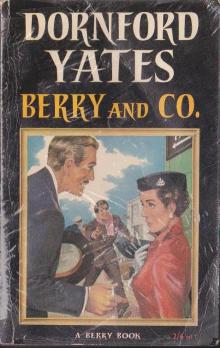 Berry and Co.
Berry and Co.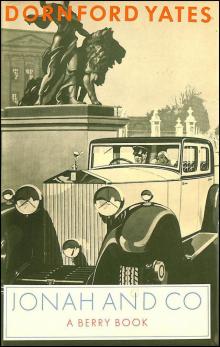 Jonah and Co.
Jonah and Co.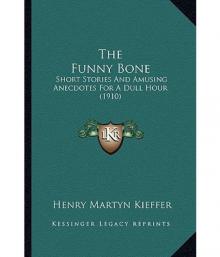 The Funny Bone: Short Stories and Amusing Anecdotes for a Dull Hour
The Funny Bone: Short Stories and Amusing Anecdotes for a Dull Hour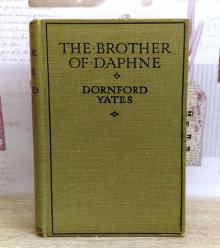 The Brother of Daphne
The Brother of Daphne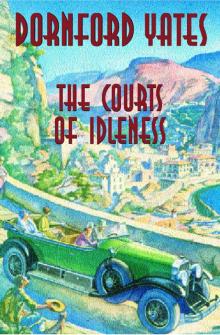 Courts of Idleness
Courts of Idleness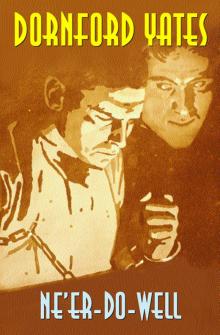 Ne'er Do Well
Ne'er Do Well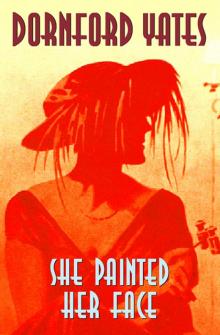 She Painted Her Face
She Painted Her Face Safe Custody and Laughing Bacchante
Safe Custody and Laughing Bacchante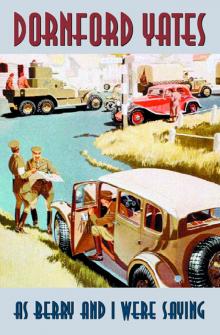 As Berry and I Were Saying
As Berry and I Were Saying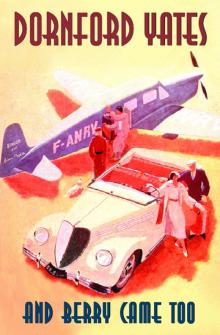 And Berry Came Too
And Berry Came Too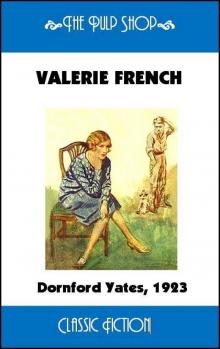 Valerie French (1923)
Valerie French (1923)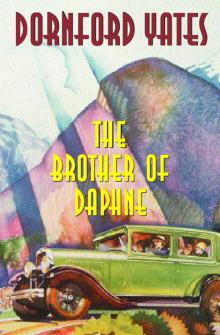 Brother of Daphne
Brother of Daphne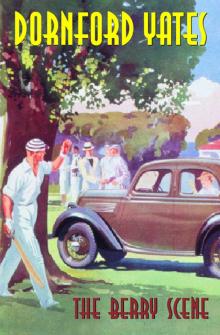 Berry Scene
Berry Scene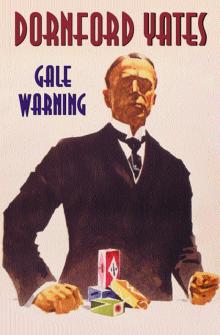 Gale Warning
Gale Warning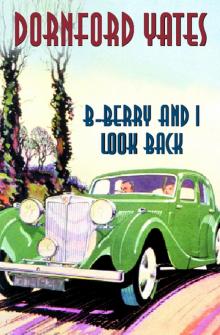 B-Berry and I Look Back
B-Berry and I Look Back Storm Music (1934)
Storm Music (1934)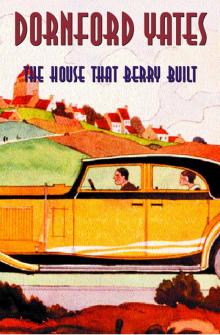 House That Berry Built
House That Berry Built